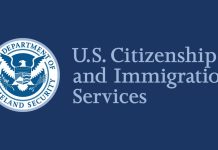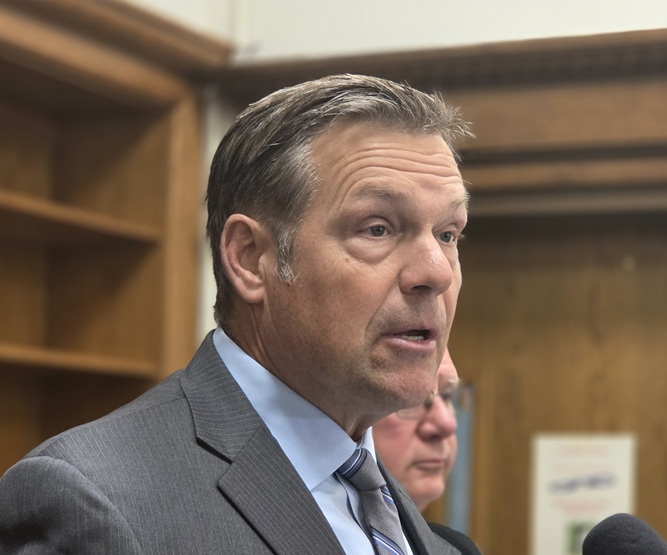Republican Attorney General Kris Kobach took the rare but not unprecedented of step taking Democratic Gov. Laura Kelly to court to force her to turn over personal data for the federal food-assistance program to the Trump administration.
Kobach filed a lawsuit in Shawnee County District Court on Monday, asking a judge to compel the governor to make the data available to the U.S. Department of Agriculture, which has been seeking the information from Kansas and other states for weeks.
The attorney general said there is nothing less at stake than hundreds of millions of dollars in federal food assistance that goes toward feeding 188,000 Kansans a month, including about 88,000 children. He accused the governor of thinking she was above the law.
“I do not take this action lightly,” said Kobach, who was joined at a news conference Monday with House Speaker Dan Hawkins and Senate Majority Leader Chase Blasi.
“But when a governor flagrantly violates the law, it is necessary for the state represented by its attorney general to take action to ensure that the governor follows the law.
“”That’s exactly what this lawsuit is about.”
This is the second time Kobach has sued the Kelly administration.
Two years ago, Kobach took the Kelly administration to court over its refusal to change a policy for allowing transgender Kansans to change their gender markers on driver’s licenses. The case is still pending in the appellate courts.
Kelly on Monday accused Kobach and Hawkins of participating in “low-rent political theater.”
“We learned last week that the attorney general made vague statements about suing me in Alaska,” Kelly said in a statement.

“My chief of staff made requests to both the attorney general and speaker for meetings to discuss this issue on Friday, and both declined to meet.
“Now, in a rushed press conference rife with false statements and incorrect law, we learn there is going to be a lawsuit filed. A copy of which my office has yet to receive.”
“I have always worked to protect Kansans, especially from federal overreach, and I will continue to do so,” she said.
There is some urgency because Kobach said the federal government will start withholding millions of dollars used to administer the food assistance program in Kansas as early as Sept. 19, similar to threats made against at least 16 other states across the country.
Kobach said he is asking for a hearing on the case for as early as next week.
He accuses the governor and state social services Secretary Laura Howard of violating a state law requiring Kansas to make available any reports sought by federal agencies when Kansas participates in a federally funded assistance program.
He also argues that the Kelly administration’s refusal to provide the data to the federal government violates the Kansas Constitution because it could lead to the termination of the food-assistance program.
Kobach said only the Legislature – not the governor – can make decisions about complying with the federal government’s conditions for participating in the food-assistance program.
The lawsuit said the governor and the social services secretary are effectively acting to remove the state from the program in violation of the Kansas Constitution by violating federal requirements to continue receiving aid.
Kobach accused the governor of playing chicken with the federal government over federal statutes he says require Kansas to provide records identifying applicants or recipients of food-assistance such as names, birth dates, addresses and Social Security numbers.
The Kelly administration has been steadfast against turning over the information, saying that state and federal law protect personal identifiable food-assistance data except when necessary to administer the program.
The administration says the requested data includes sensitive personal information for more than 730,000 Kansans who lived in a household that applied for or received food-assistance benefits from Jan. 1, 2020, to July 30, 2025.
DCF Secretary Howard said the request places a “significant burden” on state resources, and it’s not something that can be done quickly.
She said providing the data could take months and be expensive. She estimated it could cost $100,000 to provide the data to the federal government.
“DCF is committed to the security of Kansans’ personal information and maintaining confidentiality consistent with state and federal law,” Howard said previously.
“This demand for personal information goes beyond the scope of administering the program and puts in jeopardy the privacy of hundreds of thousands of Kansans who depend on SNAP to put food on their tables.”
The USDA said it needs the enrollment information to ensure the integrity of the food-assistance program to protect how taxpayer dollars are spent.
The agency says the data it seeks will ensure it has “full insight” in the integrity of the food-assistance program.
In the absence of data, the agency said it “lacks key information necessary to ensure effective stewardship of taxpayer dollars.”
The USDA said it has already discovered from states that are complying with the data-sharing requirement that fraud or duplication in state distribution of federal funds has gone unreported and needs to be resolved.
The request for information was an outgrowth of an executive order signed by the president directing federal agencies to ensure the federal government has unfettered access to comprehensive data from all state programs that receive federal funds.
The U.S. Department of Agriculture has already threatened to withhold $10.4 million in funds used to administer the food-assistance program for each quarter the state refused to meet the demands for providing the information.
Kobach said at one point the federal government could decide to terminate Kansas entirely from the federal food-assistance program after it cuts off administrative funds for the program if the governor still refuses to provide the information.
“The state of Kansas losing that money is bad enough,” Kobach said.
“But when that money is being taken out of the pockets of needy Kansans trying to put food on the table, that is unthinkable,” he said.
“That is something that I would imagine no Kansas politician would want to see, no Kansas governor would want to see,” he said.
“It is unclear to me why the governor thinks it’s OK to take food off the table of needy Kansans so she can demonstrate to the world that she is opposing the Trump administration,” Kobach said.
The Kelly administration has been closely watching a case from California where a coalition of 21 states and Washington, D.C., filed a lawsuit challenging the USDA’s demand for states to turn over personal data about food-assistance recipients.
At one point, the Kelly administration said it could be potentially liable if it releases the data and a court finds that the USDA’s demand violates federal law, a point Kobach denounced Monday.
Kobach said the California case has no bearing on Kansas since it’s in a different judicial circuit and the U.S. Supreme Court has now limited national injunctions.
“The idea that a random lawsuit of dubious merit in a distant jurisdiction…some how allows a governor in another state to refuse to follow the law – that’s crazy and it’s lawless,” he said. “The bottom line is: The governor is not above the law.”
In their lawsuit, the 21 states have argued the USDA is making an unprecedented demand for them to turn over sensitive and personal information about tens of millions of Americans who have applied for food assistance.
“USDA’s attempt to collect this information from plaintiff states flies in the face of privacy and security protections in federal and state law,” the states said.
“USDA makes this demand for the stated purpose of detecting ‘overpayments and fraud,’” the states said.
“Instead, the move appears to be part of the federal government’s well-publicized campaign to amass enormous troves of personal and private data, including information on taxpayers and Medicaid recipients, to advance goals that have nothing to do with combating waste, fraud, or abuse in federal benefit programs.”
The plaintiff states have since filed a motion trying to not only block the demand for the food-assistance information but to stop any efforts that could lead to cutting off funding for the program.
A judge has now set oral arguments in the case for Sept. 16, with Sept. 19 looming as a possible date for cutting off funds used to administer the food-assistance program to the states that brought the lawsuit.
The USDA says it will be harmed if an injunction is issued in that case.
“Plaintiffs’ proposed injunction would limit the president’s ability to effectuate the policies the American people elected him to pursue, including the president’s ability to identify fraud, waste, and abuse in this critical program,” the agency argued.















